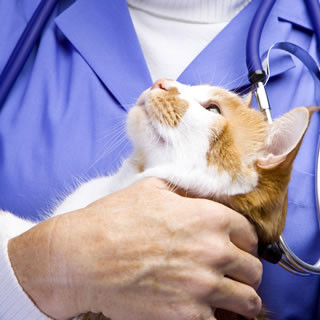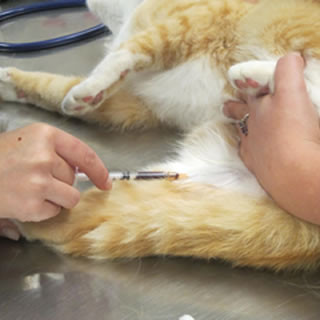Heartworm disease is a serious and potentially deadly condition that affects pets worldwide, and while often associated with dogs, cats can indeed get heartworm. It’s crucial for cat owners to understand this risk and take preventative measures to protect their feline companions. While heartworm disease manifests differently in cats compared to dogs, it poses a significant threat to their health and well-being. This article will delve into the intricacies of heartworm disease in cats, exploring transmission, symptoms, diagnosis, and most importantly, how to prevent this silent threat.
Yes, Cats Are Susceptible to Heartworm Disease: Unveiling the Facts
Contrary to popular belief, cats are not immune to heartworm disease. Heartworms, foot-long parasites, can reside in the heart, lungs, and associated blood vessels of cats, leading to severe health complications. Although cats are not the ideal host for heartworms like dogs, infection can still result in significant lung disease, heartworm-associated respiratory disease (HARD), and even sudden death.
It’s important to recognize that the nature of heartworm infection differs between cats and dogs. In dogs, heartworms thrive, mature, and reproduce, often leading to a heavy worm burden if left untreated. However, in cats, most heartworms don’t survive to adulthood. Typically, cats may harbor only one to three adult worms, and in many cases, infections in cats may not even involve adult worms. This often makes diagnosis more challenging in cats, but it doesn’t diminish the severity of the disease. Even immature heartworms can cause substantial damage, primarily in the form of HARD.
 Alt text: Close-up illustration of adult heartworms, long parasitic worms that can infect cats, residing in the heart and blood vessels.
Alt text: Close-up illustration of adult heartworms, long parasitic worms that can infect cats, residing in the heart and blood vessels.
While the treatment for heartworm in dogs is available, the same medications cannot be safely used in cats. This makes prevention the cornerstone of protecting cats from heartworm disease. Understanding the risks and taking proactive steps is essential for every cat owner.
How Do Cats Contract Heartworm? The Mosquito Connection
The transmission of heartworm disease relies heavily on mosquitoes. Mosquitoes act as the intermediary host, carrying heartworm larvae from infected animals to susceptible ones. Here’s a step-by-step breakdown of the transmission process:
- Infected Host: The cycle begins with an infected animal, typically a dog, coyote, or fox, harboring adult heartworms. These adult female heartworms produce microscopic baby worms called microfilariae that circulate in the bloodstream.
- Mosquito Bites Infected Animal: When a mosquito feeds on an infected animal, it ingests blood containing these microfilariae.
- Larval Development in Mosquito: Inside the mosquito, the microfilariae develop into “infective stage” larvae over 10 to 14 days.
- Mosquito Bites Cat: When the infected mosquito bites a cat, these infective larvae are deposited onto the cat’s skin and enter through the bite wound.
- Maturation in Cat: Once inside the cat, it takes around six months for the larvae to mature into adult heartworms.
It’s crucial to understand that mosquitoes are the sole vector for heartworm transmission. Cats cannot get heartworm directly from other cats or dogs. The risk is present wherever mosquitoes are found, making heartworm a concern for both indoor and outdoor cats. Even indoor cats are susceptible as mosquitoes can easily enter homes.
Recognizing Heartworm Symptoms in Cats: Subtle Signs to Watch For
Heartworm disease in cats can be challenging to detect because the symptoms are often subtle and non-specific, mimicking other feline respiratory illnesses. Unlike dogs that often exhibit more pronounced symptoms, cats may present with vague or intermittent signs. It’s vital for cat owners to be vigilant and recognize potential symptoms, which can range from mild to severe and even sudden.
Common signs of heartworm disease in cats can include:
- Coughing: A persistent cough, sometimes mistaken for hairballs, can be an indicator.
- Asthma-like Attacks: Wheezing, difficulty breathing, or rapid breathing can mimic feline asthma. This is often related to Heartworm Associated Respiratory Disease (HARD).
- Periodic Vomiting: Unexplained vomiting, not associated with food intake, can be a symptom.
- Loss of Appetite and Weight Loss: Decreased interest in food and subsequent weight loss can occur.
- Lethargy: Reduced energy levels and general sluggishness.
In more severe cases, cats may exhibit:
- Difficulty Walking: Uncoordinated movements or weakness in limbs.
- Fainting or Seizures: Neurological signs due to heartworm impact.
- Fluid Accumulation in the Abdomen: Swollen abdomen, indicating fluid buildup.
- Sudden Collapse or Death: Tragically, the first and only sign can be sudden collapse or death, highlighting the severity of the disease.
 Alt text: Veterinarian examining a cat in a clinic, emphasizing the importance of regular check-ups for early heartworm detection.
Alt text: Veterinarian examining a cat in a clinic, emphasizing the importance of regular check-ups for early heartworm detection.
Because these symptoms are easily confused with other feline ailments, it’s crucial to consult a veterinarian if your cat exhibits any of these signs. Early detection is paramount for managing heartworm disease in cats.
Diagnosing Heartworm in Cats: A Multifaceted Approach
Diagnosing heartworm in cats is more complex than in dogs due to the atypical nature of the infection in felines. Since cats often have fewer adult worms or no adult worms at all, traditional heartworm antigen tests, which detect adult worm proteins, may be less reliable. Veterinarians typically employ a combination of diagnostic tools to determine if a cat has heartworm disease.
Common diagnostic methods include:
- Antibody Test: This blood test detects the presence of antibodies to heartworm larvae, indicating exposure to heartworms. A positive antibody test suggests the cat has been exposed, but doesn’t confirm an active adult worm infection.
- Antigen Test: While less sensitive in cats than dogs, an antigen test may still be used to detect adult female heartworm proteins. A positive result is significant but a negative result doesn’t rule out heartworm disease, especially HARD.
- Chest X-rays (Radiographs): X-rays can reveal abnormalities in the lungs and blood vessels indicative of heartworm disease or HARD.
- Echocardiogram (Ultrasound of the Heart): In some cases, an ultrasound can visualize adult heartworms in the heart and assess heart function.
- Complete Blood Count and Blood Chemistry: These tests help evaluate the cat’s overall health and can provide supportive evidence.
Veterinarians often use a combination of antibody and antigen tests for screening cats. Due to the complexity of diagnosis, a veterinarian’s expertise is essential for accurately diagnosing heartworm disease in cats.
Treatment Options for Heartworm in Cats: Management and Supportive Care
Unfortunately, there is no FDA-approved drug to treat heartworm infection in cats. The medication used to eliminate heartworms in dogs is not safe for feline use. Therefore, the approach to managing heartworm-positive cats focuses on supportive care and symptom management.
Here’s what to expect if your cat tests positive for heartworm:
- Diagnosis Confirmation: Further diagnostic tests may be needed to assess the severity of the disease and rule out other conditions.
- Monitoring: If the cat is stable and not showing severe respiratory distress, the veterinarian may recommend monitoring the cat closely. Cats can sometimes clear heartworm infections on their own, although damage may be permanent. Chest X-rays every 6-12 months may be advised.
- Symptom Management: Medications like corticosteroids (e.g., prednisolone) may be prescribed to reduce inflammation in the lungs and airways, particularly for cats with HARD symptoms like coughing and wheezing.
- Supportive Veterinary Care: For severe cases, hospitalization may be necessary to provide intensive care, including intravenous fluids, oxygen therapy, bronchodilators, and medications to manage heart and lung symptoms.
- Surgical Removal (Rare): In very rare instances, surgical removal of heartworms may be considered.
It’s crucial to understand that treatment for heartworm in cats is about managing the disease and alleviating symptoms, not eliminating the adult worms like in dogs. The focus is on providing the best possible quality of life for the affected cat.
Prevention is Paramount: Protecting Your Cat from Heartworm Disease
Given the lack of effective treatment and the potential severity of heartworm disease in cats, prevention is undeniably the best strategy. Protecting your cat from heartworm is relatively simple and significantly less expensive than managing the disease.
Here are key preventative measures:
- Year-Round Heartworm Preventatives: The American Heartworm Society recommends year-round heartworm prevention for cats, regardless of whether they are indoor or outdoor. Monthly preventatives are available in topical “spot-on” formulations and oral pills.
- Early Prevention for Kittens: Start kittens on heartworm preventatives as early as the product label allows, ideally no later than 8 weeks of age.
- Veterinary Consultation: Consult your veterinarian to determine the most appropriate heartworm preventative for your cat based on their age, lifestyle, and health status.
- Regular Testing: While preventatives are highly effective, annual heartworm testing is recommended to ensure your cat remains protected, especially before starting preventatives and as advised by your vet.
 Alt text: Veterinarian drawing a blood sample from a cat for heartworm testing, emphasizing the routine nature of preventative care.
Alt text: Veterinarian drawing a blood sample from a cat for heartworm testing, emphasizing the routine nature of preventative care.
Heartworm preventatives work by eliminating the immature larval stages of heartworms before they can mature into adults. They are highly effective when given consistently and on schedule. Missing doses can leave your cat vulnerable to infection.
Understanding Heartworm Testing and Prevention Schedules
Regular heartworm testing and consistent preventative administration are vital components of protecting your cat.
Heartworm Testing:
- Annual Testing: The American Heartworm Society recommends annual heartworm testing for all cats.
- Testing Before Prevention: Ideally, cats should be tested before starting heartworm preventatives to ensure they are not already infected. However, this is less critical for kittens under 6 months old.
- Types of Tests: Veterinarians typically use a combination of antibody and antigen tests for cats.
Prevention Schedule:
- Year-Round Prevention: Administer heartworm preventative medication to your cat year-round, even in colder climates, as mosquitoes can be present indoors.
- Monthly Administration: Most preventatives are given monthly, either topically or orally. Adhere strictly to the recommended schedule.
- Veterinary Prescription: Heartworm preventatives require a veterinary prescription in the US. This ensures your cat receives the appropriate medication and dosage.
- Dosage Based on Weight: Dosage is determined by your cat’s weight, so regular weigh-ins at vet visits are important to ensure correct dosing, especially for growing kittens.
By adhering to recommended testing and prevention schedules, you can significantly reduce your cat’s risk of contracting heartworm disease and ensure their long-term health and well-being.
Conclusion: Proactive Heartworm Prevention for a Healthy Feline Life
While the question “Can Cats Get Heartworm?” is a definitive yes, the good news is that heartworm disease in cats is largely preventable. Understanding the risks, recognizing potential symptoms, and prioritizing year-round prevention are crucial steps for every cat owner. Although heartworm disease presents unique challenges in cats compared to dogs, proactive measures, guided by your veterinarian, can effectively protect your feline companion from this serious and potentially fatal disease. Don’t wait for symptoms to appear; talk to your vet about heartworm prevention today and ensure a healthy, heartworm-free life for your beloved cat.

